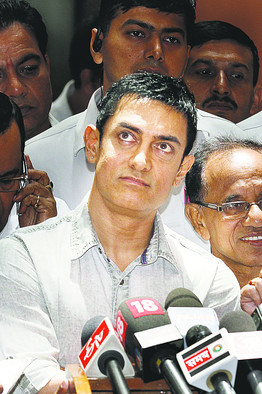
Nice WSJ weekend piece that chronicles the recent media rise of a sort of muckraking Phil Donahue (the original US avatar of the wave of "truth" exposing shows that blossomed in his wake - Sally Jesse, Oprah, and so on) in India:
The format of "Truth Alone Prevails" is simple. (The show airs on the Star network, which, like The Wall Street Journal, is owned by News Corp.) Mr. Khan introduces the issue of the day to a live studio audience; a short video is shown, featuring a real-world case of hardship or injustice; and then, with only a modest amount of television wizardry, the lights come up and the person from the video is on stage, seated opposite Mr. Khan. And they begin to talk. Mr. Khan does not dazzle the audience with his star power; for the most part, he just listens. It is his guests, often heartbreakingly ordinary, who do the talking.
What emerges from their stories is a creeping horror, a vision of modern India that is stark and deeply unsettling: the family whose mother's life is snatched away, they say, in a botched and unauthorized organ transplant; the 12-year-old girl who accuses a 55-year-old family friend of sexual abuse; the call-center worker who tells of the forced abortion of her female fetuses—six times in eight years—at the hands of her husband's family. Mr. Khan's style is wry and laid back, but occasionally the stories are too much for him, and his eyes well with tears.
“Though all manner of cruelty and casual violence are on display, the show is essentially uplifting.”
India has not always been comfortable looking this hard at itself. Mr. Khan's show indicates a new candor and boldness, and the response has been staggering. As he told me, "We used to sit back, my team and I, and discuss how people would react, what they would feel. And the kind of response we dreamed of, and hoped for, that is exactly what we're getting." He admits to being emotionally drained by the show at times: "There's a lot of trauma, a lot of distress, a lot of injustice" out there, he said, and he has yet to commit to a second season. But he also says that he encountered an "equal number of examples of courage, high levels of integrity and deeply honed values."
Critics have accused Mr. Khan of being far less reliable on scientific issues than he is on social ones. Some also say that the show is preachy, even messianic, and that its research is not always up to scratch.
This, and the rise of "bureacratic lit" (obliquely critical books on Chinese officialdom), are signposts - in my mind - of the inevitable progressive wave (lasting decades in length) that both India and China are doomed to "suffer." It's just what comes next . . . after such tumultuous rises where so much of society is exposed to opportunity in which many succeed, some take cruel advantage (nothing succeeds like excess), and plenty feel screwed over (the populist anger impulse).
The end of the WSJ says it all:
What gives "Truth Alone Prevails" its optimism is the voice of India's new middle class, which is increasingly politically and socially aware, though still unsure of itself and its newfound wealth and security. If the old India of my childhood [writer is an Indian part-time expat] - which was a far bleaker place - is to be superseded, it will depend on this new class' ability to understand and defend the freedoms that have enriched it.
Beautifully written and very perceptive piece, and a genuine signpost for analysts who track strategic trends.